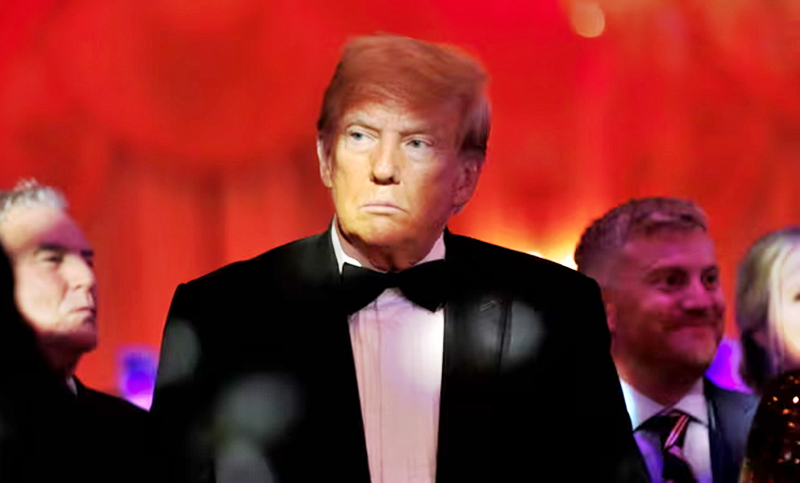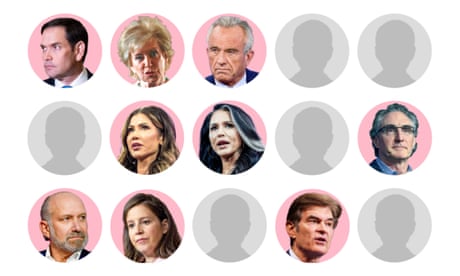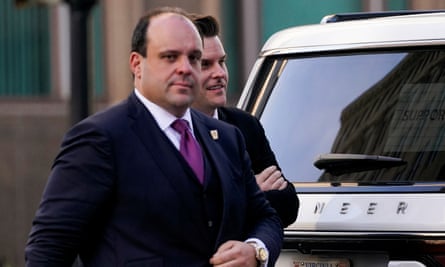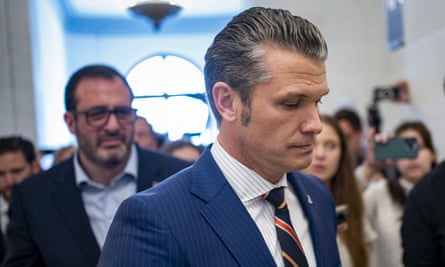Trump cabinet picks shaped by new power centers in his orbit

By Guardian-Hugo Lowell -Fri 29 Nov 2024 12.00 GMT
Donald Trump’s picks for the incoming administration are being shaped by a combination of different power centers including one-man influences like top Trump adviser Boris Epshteyn and combined groups led by chief of staff Susie Wiles and vice-president-elect JD Vance.
Boris Epshteyn, Susie Wiles and JD Vance hold outsized influence in the president-elect’s administration selections. The president-elect appears to have settled on a number of cabinet nominees himself without being aggressively pushed by advisers, including Pete Hegseth for defense secretary, Marco Rubio for secretary of state and Russ Vought to lead the Office of Management and Budget.
But for other cabinet roles or major White House positions for which Trump did not have a clear preference or a frontrunner in mind, a handful of individuals with outsized influence have come to dominate the decision-making in meetings and interviews being held at Trump’s Mar-a-Lago club in Florida.

There are still factions, according to half a dozen people involved in transition planning, though they have been nowhere near as concrete as they were in 2017, when there were clear demarcations between Trump’s family, the Republican National Committee, establishment Republicans and people allied with Trump’s strategist Steve Bannon.
And in recent months, the previously distinct camp informally led by Wiles, who has had influence over West Wing picks and some cabinet roles, and the other camp led by Vance have combined and engulfed the wider Trump orbit, the people said.
“It’s ever-shifting sands of allegiance. The people who you think are your friends may not be the case in 24 hours. We’re all friends but none of us are friends,” said one person adjacent to the Trump team.
Although there are people in Trump’s orbit who disagree with Epshteyn, there is universal acknowledgment that he has had significant influence in the first weeks of the presidential transition, a reflection of Trump’s appreciation for his help in sidestepping his many criminal investigations.
When Trump floated the idea of having the congressman Matt Gaetz for attorney general, Epshteyn was supportive of him during a round-trip flight from Palm Beach, Florida, to Washington. After Trump returned to Palm Beach, he announced he was nominating Gaetz.

After the Gaetz nomination sank in the face of holdout Senate Republicans refusing to confirm him over sexual misconduct allegations, Trump nominated as a replacement former Florida attorney general Pam Bondi – who has been friendly over the years with Epshteyn.
Epshteyn has also played key roles in finalizing the leadership at the justice department, recommending that Trump keep his personal lawyers in key jobs: Todd Blanche for deputy attorney general, Emil Bove for the principal deputy position and John Sauer for solicitor general.
One through-line about those lawyers was that they were successful in delaying until after the election the federal criminal cases against Trump, which were dismissed on Monday. But the other was that they were all recruited by Epshteyn at a time when Trump struggled to find lawyers.
Epshteyn, whose physically imposing presence is regularly fitted into a navy three-piece suit, has flexed his power away from the department as well, recommending Bill McGinley to be the next White House counsel.
Epshteyn’s motivations are generally seen as twofold: to do what benefits Trump and to do what benefits his own position in Trumpworld, which has meant he has sometimes advocated for people endorsed by allies or have appeared on his longtime friend Steve Bannon’s War Room podcast.
From the outside, Bannon pushed for McGinley to be White House counsel and may yet get another victory if Trump picks Kash Patel, a regular guest on War Room, for the FBI director or the deputy FBI director roles for which he remains in the running, the Guardian has reported.
Bannon lobbied for Vought to lead the Office of Management and Budget and, in a particularly audacious play, managed to get Sebastian Gorka, the deeply polarizing national security aide from the first Trump administration, into the incoming team as the senior counter-terrorism director.
He also played an instrumental role in bringing Scott Bessent to the fore, according to a person directly familiar with the matter. Bannon made the first introduction to Trump years ago, while his allies have advocated for him at Mar-a-Lago and pushed his agenda.

But a main power center for cabinet picks is widely seen to rest with JD Vance’s crew, which pushed for Bessent to be named as treasury secretary and Brendan Carr to lead the Federal Communications Commission, among others.
The Vance crew is informally said to involve Trump’s eldest son, Don Jr – who pushed for Vance to be his father’s running mate – and Don Jr’s close advisers including Arthur Schwartz and Andrew Surabian, as well as former Fox News host Tucker Carlson.
In addition to being seen as getting Bessent the nod when Trump still had his doubts, the Vance crew have earned additional juice with Trump in probably securing enough Republican votes for Hegseth to be confirmed as defense secretary, despite another set of sexual misconduct allegations.
For West Wing picks, the incoming White House chief of staff, Susie Wiles, has extended her personal influence with Trump. Wiles has mostly been able to get the staff of her choosing without having to fight against competing interests.
Wiles’s top aides have landed in deputy chief of staff roles, including James Blair for legislative policy, Taylor Budowich for presidential personnel and Steven Cheung as communications director – although the factions are amorphous and Budowich and Cheung are also close to the Vance crew.
Then there are individuals – relative newcomers to the Trump orbit – who have been in transition meetings at Mar-a-Lago as a result of their unique situations: Elon Musk, the world’s richest man, and Howard Lutnick, the chief executive of Cantor Fitzgerald, who is also the co-chair of the Trump transition team.
By weighing in on major cabinet picks, Musk has gotten on the nerves of some Trump loyalists, including Epshteyn, who have complained that the billionaire knows little of the Trump agenda they are trying to bring about and has little idea about who would be best placed to enact it.
Lutnick has retained his authority through his transition co-chair role, although he recently engaged in some accidental self-sabotage by pushing too hard to be treasury secretary and appeared to have been caught in a leak investigation over the nominee for secretary of agriculture.
Trump was irritated by Musk’s post on X pushing Lutnick for treasury secretary, which gave an opening for his main rival Bessent to secure the job instead. Still, Lutnick has continued to be close to Trump and last week was named commerce secretary.
Musk, who is staying off-site in Palm Beach, has become more judicious with his interactions with Trump since that episode and after he secured himself his own role to lead the so-called “Department of Government Efficiency”
